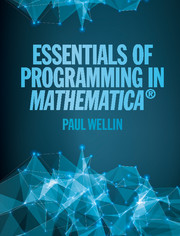Summary
Programming with Mathematica
In its brief history, the world of programming has undergone a remarkable evolution. Those of us old enough to remember boxes of punch cards and batch jobs couldn't be happier about some of these changes. One could argue that the limitations, physical and conceptual,of the early programming environments helped to focus that world in a very singular manner. Eventually, efforts to overcome those limitations led to a very visible and broad transformation of the world of computer programming. We now have a plethora of languages, paradigms, and environments to choose from. At times this embarrassment of riches can be a bit overwhelming, but I think most would agree that we are fortunate to have such variety in programming languages with which to do our work.
I learned about Mathematica as I suspect many people have – after using several languages over the years, a colleague introduced me to a new and very different tool, Mathematica. I soon realized that it was going to help me in my work in ways that previous languages could not. Perhaps the most notable feature was how quickly I could translate the statement of a problem to a working program. This was no doubt due to having a functional style of programming at my fingertips but also being able to think in terms of rules and patterns seemed to fit well with my background in mathematics.
Well, Mathematica is no longer a young up-start in the programming world. It has been around now for over 25 years, making it, if not an elder statesman, certainly a mature and familiar player. And one that is used by people in fields as varied as linguistics, bioinformatics, engineering, and information theory. Like myself, many people are first introduced to it in an academic setting. Many more are introduced through a colleague at work. Still others have seen it mentioned in various media and are curious as to what it is all about. After using it to do basic or more advanced computation, most users soon find the need to extend the default set of tools that come with Mathematica.Programming is the ticket.
So what makes Mathematica such a useful programming tool? First, it is a well-designed language, one whose internal logic will be quite apparent as you get to know it.
- Type
- Chapter
- Information
- Essentials of Programming in Mathematica® , pp. xi - xviPublisher: Cambridge University PressPrint publication year: 2015



